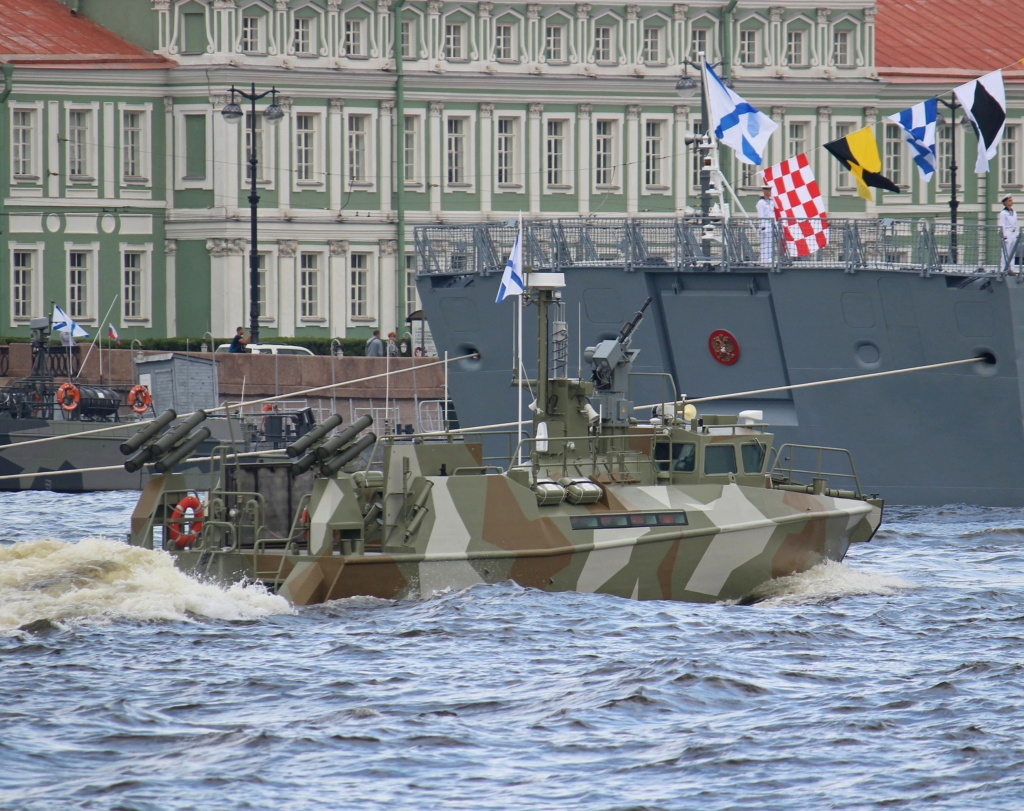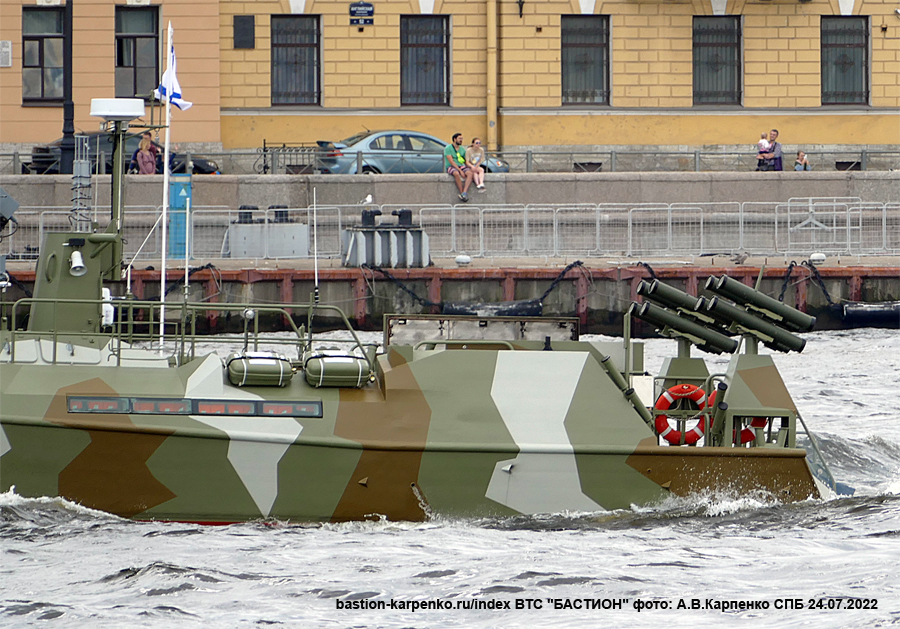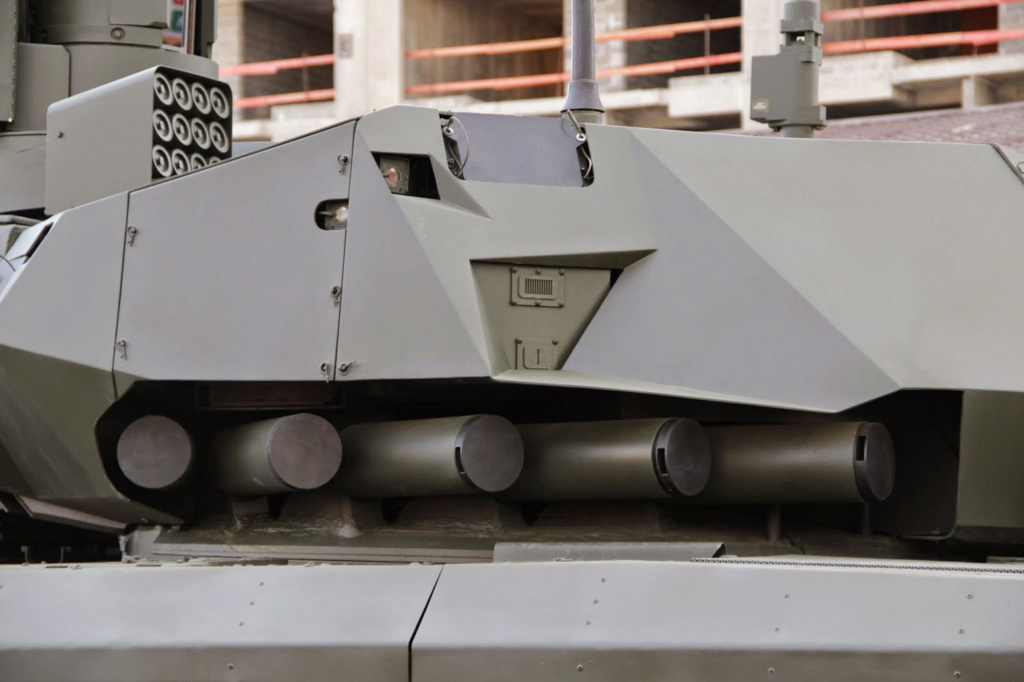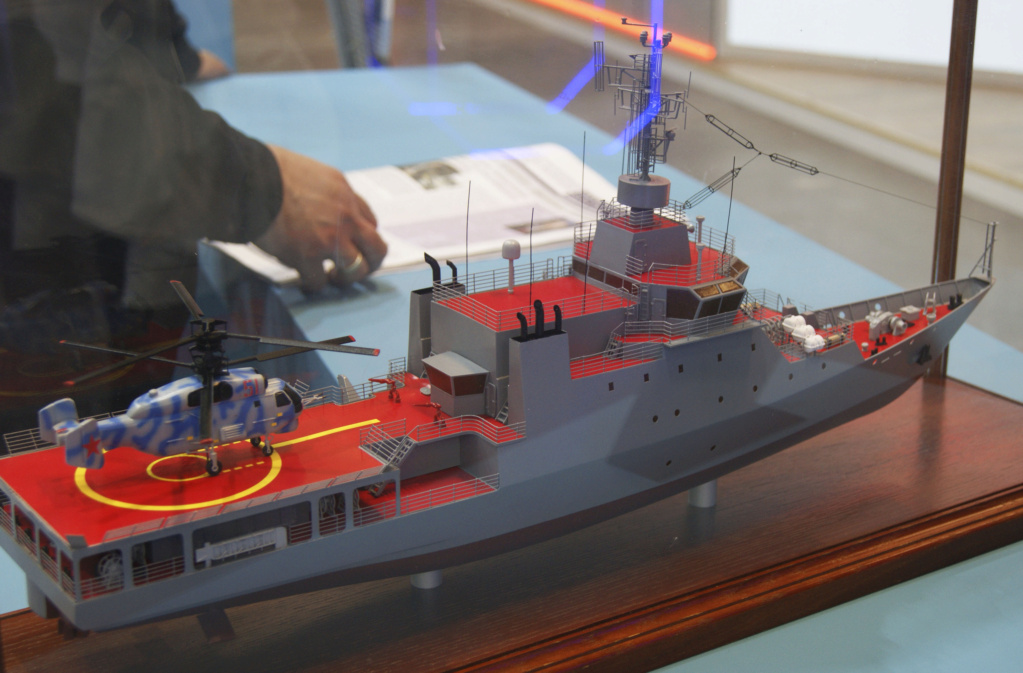Auxilliary vessels, Special-purpose and minor naval ships

Krepost- Posts : 741
Points : 743
Join date : 2021-12-07
lyle6 likes this post

GarryB- Posts : 39671
Points : 40167
Join date : 2010-03-30
Location : New Zealand
Apart from the remote weapon mount, the only other possible control for the missiles would be the green box on the centre roof front of the cabin of the boat though it looks rather small and does not seem to have a front optical port visible....

Hole- Posts : 10982
Points : 10962
Join date : 2018-03-24
Age : 48
Location : Scholzistan
franco, Sprut-B, LMFS, lyle6 and Mir like this post

xeno- Posts : 253
Points : 256
Join date : 2013-02-03

GarryB- Posts : 39671
Points : 40167
Join date : 2010-03-30
Location : New Zealand
BTW are they actually Afghanits or are they smoke/decoy grenades?

flamming_python- Posts : 9284
Points : 9346
Join date : 2012-01-30
GarryB, franco, Hole and lyle6 like this post

Hole- Posts : 10982
Points : 10962
Join date : 2018-03-24
Age : 48
Location : Scholzistan
lyle6 and Mir like this post

Isos- Posts : 11379
Points : 11347
Join date : 2015-11-06

GarryB- Posts : 39671
Points : 40167
Join date : 2010-03-30
Location : New Zealand
Equally if not massively enlarged they would be too small and too short ranged to be effective against anti ship missiles.
Your average western anti ship missiles have warheads ranging from 50kgs for small missiles to about 200kgs for the standard ones that are intended to disable a ship.
Soviet and Russian anti ship missiles with their missile size and kinetic energy as well as the large size of their warheads intercepting them a few metres away from the ship would make very little difference in regards to saving the ship as it would take enormous damage.
A 700kg to 1,000kg warhead in some of the bigger missiles will seriously damage a modern ship even if it is detonated 300m away from the ship...
Smoke or decoy rockets on the other hand just need to conceal the presence of the boat or ship while IR and chaff dipoles can be launched to create heat shapes and radar signatures a few kms away from the actual boat to distract radar and IR guided weapons.

lyle6- Posts : 2296
Points : 2290
Join date : 2020-09-13
Location : Philippines
Effectors mounted on the stern facing upwards. Possible anti-top attack capabilities.
The inclined Kornet launchers also suggest possible anti-air use.
They are hard kill effectors for the Afghanit-lite used by the Kurganets.GarryB wrote:That would only leave either that tiny optical periscope on the cabin roof or the EO system of the RWS to guide the Kornets...
BTW are they actually Afghanits or are they smoke/decoy grenades?
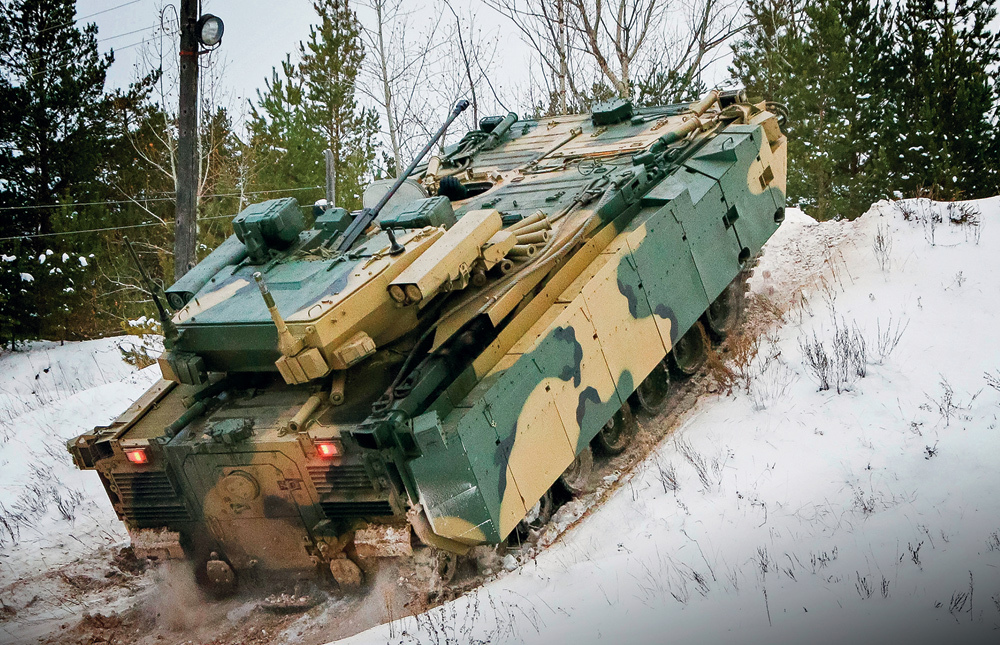
The aiming head for the Kornet is probably on a deployable tall mast, to avoid sea spray.
The box is the LWR with what seems like two windows for coarse and precise angle measurements.Hole wrote:
They look like the launchers and in the green box are the sensors. Clearly meant to protect the boat while the assault detail leaves it at some beach.
Hole and Broski like this post

GarryB- Posts : 39671
Points : 40167
Join date : 2010-03-30
Location : New Zealand
Effectors mounted on the stern facing upwards. Possible anti-top attack capabilities.
Do you know for sure or are you speculating?
Smoke and IR/Chaff decoy launchers would be mounted with similar orientation but would not require the AESA radar and optical sensors to detect incoming munitions that the Afghanit to be effective.
The inclined Kornet launchers also suggest possible anti-air use.
Considering the vessel type I would think the rear mounted inclined Kornets are intended to engaging targets on the beach firing on the boat... the lack of a trailing wire and the stabilised laser guidance suggests unless it is landing in heavy surf it should be able to engage targets on the beach firing at the ships during landing... for which smoke rockets might be useful too.
They are hard kill effectors for the Afghanit-lite used by the Kurganets.
Official release or your guess?

Krepost- Posts : 741
Points : 743
Join date : 2021-12-07
George1, Hole, gc3762 and Arkanghelsk like this post

George1- Posts : 18400
Points : 18897
Join date : 2011-12-22
Location : Greece
https://bmpd.livejournal.com/4579108.html
GarryB, franco, zardof, LMFS, Hole, Belisarius and Podlodka77 like this post

AMCXXL- Posts : 1006
Points : 1006
Join date : 2017-08-08
Anti-sabotage boat "Grachonok" joined the Russian Navy
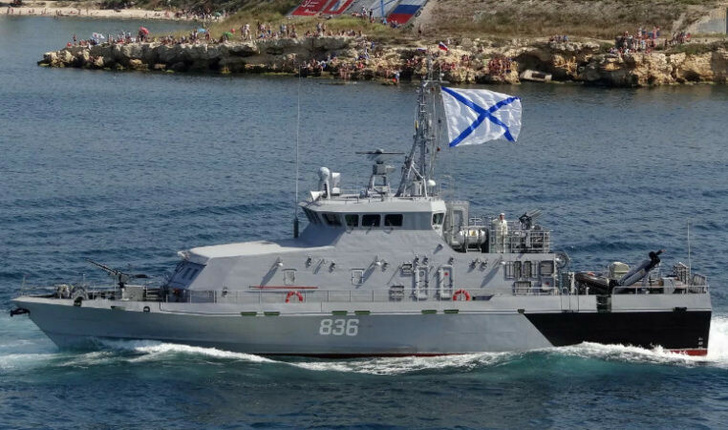
Another anti-sabotage boat of project 21980 (code "Grachonok") replenished the Russian Navy - the ship entered service with the Leningrad Naval Base (LenVMB), the Russian Defense Ministry said on Tuesday.
The Ministry of Defense recalled that this year this is the second boat of this type that entered service with the base.
The solemn ceremony of hoisting the naval flag on the boat took place in the morning in Kronstadt under the leadership of the commander of the LenVMB captain 1st rank Andrey Saloshin, who handed over the flag of St. Andrew to the commander of the boat, midshipman Vitaly Kasyanov.
After raising the flag, the boat officially became part of the Navy.
At present, the boat has only a side number - the boat will receive its own name in accordance with the order of the Commander-in-Chief of the Navy.[/size][/size]
https://sdelanounas.ru/blogs/148819/
https://ru.wikipedia.org/wiki/Противодиверсионные_катера_проекта_21980
With this new Pr.21980 ship, there are a total of 23 in service in the Russian Navy:
6 in the Pacific, 4 in the North, 4 in the Baltic, 6 in the Black Sea and 3 in the Caspian Sea
Last edited by AMCXXL on Wed Nov 02, 2022 10:27 pm; edited 2 times in total
Hole likes this post

franco- Posts : 6796
Points : 6822
Join date : 2010-08-17
Fleets
Baltic Fleet: P-104, 468, 471
Black Sea Fleet: P-191, 349, 350, 355, 424, 433, PDK №478 (Internal Troops), 479 (Internal Troops), 480 (Internal Troops), 481 (Internal Troops)
Pacific Fleet: P-377, 417, 420, 431, 445, 450
Northern Fleet: P-340, 421, 429, 430
Caspian Flotilia: P-351, 449, Yunarmeets Tatarstana
http://russianships.info/eng/warfareboats/project_21980.htm
zardof and Hole like this post

Podlodka77- Posts : 2589
Points : 2591
Join date : 2022-01-06
Location : Z
November 24, 2022 at 7:51 Subject: Navy
BGK "Anatoly Knyazev" will be included in the Baltic Fleet ahead of schedule
The large hydrographic boat "Anatoly Knyazev" of project 19920 has passed a full cycle of preparation for admission to the Russian Navy. According to the press service of the Russian Defense Ministry, on Thursday, November 24, a solemn ceremony of hoisting the flag of the hydrographic service of the Navy will take place on the ship. The event will take place in St. Petersburg.
According to the agency, on Tuesday, November 22, the order to approve the acceptance certificate of the boat and enroll it in the hydrographic area of the Leningrad naval base of the Baltic Fleet was signed by the Commander-in-Chief of the Russian Navy, Admiral Nikolai Evmenov.

Large hydrographic boat "Anatoly Knyazev"
Photo; Ministry of Defense of the Russian Federation
BGK was built at the Okskaya Shipyard. The ship was laid down in June 2021. Sea trials began in mid-October 2022.
The boat is named in honor of Anatoly Knyazev, the organizer and participant of the Arctic tests of the first high-latitude navigation complex during the nuclear submarine's voyage to the North Pole in 1963.
Hydrographic boats of project 19920, developed by the Nizhny Novgorod Design Bureau "Vympel", are needed to ensure the safety of navigation: pilotage and leading submarines, maintenance and repair of coastal and floating aids to navigation, performance of hydrographic works, delivery of personnel, special equipment and cargo at a distance up to 1000 miles.
The boats are equipped with modern equipment, which significantly expands the possibilities of hydrographic and hydrological work, the press service of the military department emphasized.
https://flot.com/2022/%D0%91%D0%B0%D0%BB%D1%82%D0%B8%D0%B9%D1%81%D0%BA%D0%B8%D0%B9%D0%A4%D0%BB%D0%BE%D1%8228/
GarryB and Hole like this post

Podlodka77- Posts : 2589
Points : 2591
Join date : 2022-01-06
Location : Z
The oceanographic research vessel "Evgeny Gorigledzhan", re-equipped at the Baltic Shipyard "Yantar" (part of the USC), is completing factory sea trials in the Baltic Sea.
The program of factory sea trials provides for the verification of all its systems and mechanisms. Upon completion of the tests of the OIS "Evgeny Gorigledzhan" will begin state sea trials.
The ship has completed all the checks of the power plant necessary for the start of state tests. Until December 20, it is planned to complete the factory trials with the further presentation of an order for state tests.
According to Dmitry Fominsky, head of the project managers department, factory sea trials are a very important stage. "The delivery team and the crew are working hard and well-coordinated."
https://vk.com/video-185794109_456239134
(VIDEO link)
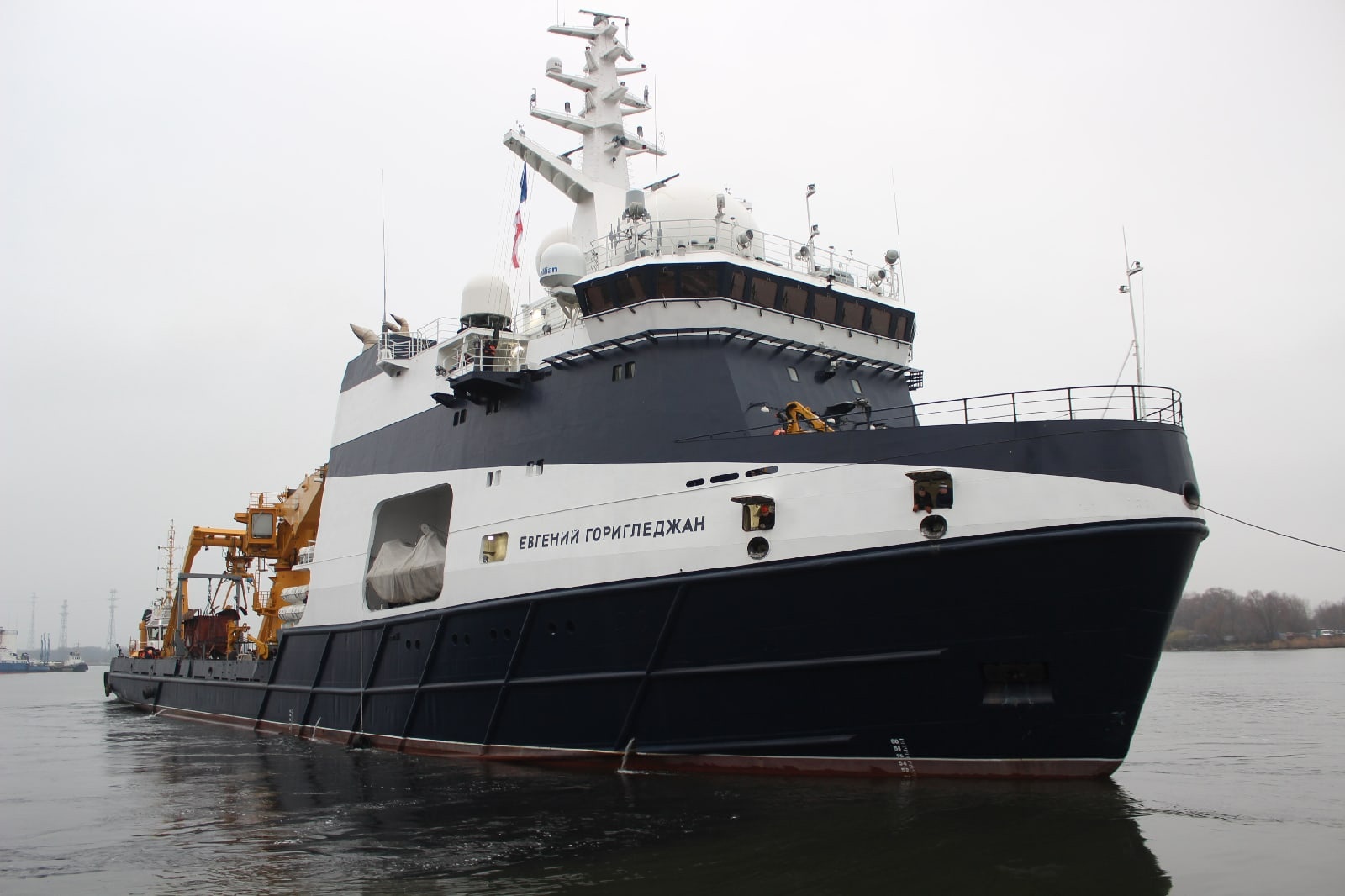
GarryB, George1 and Hole like this post

franco- Posts : 6796
Points : 6822
Join date : 2010-08-17
MOSCOW, January 10-RIA Novosti. Khabarovsk Shipyard plans to start this year the construction of amphibious hovercraft "Murena" on a modernized project, said in an interview with "Vesti. Khabarovsk " chief engineer of the plant Sergey Korolev. Khabarovsk Shipbuilding Plant (KHSZ) is a part of the United Shipbuilding Corporation.
"We defended the initiative work, a technical project to create amphibious hovercraft of the Moray Eel type. This is an absolutely unique project for our plant, no one has ever built it before, now it is being upgraded, and we expect to sign a contract this year. <...> We hope that this year we will start building, " said Korolev.
From 1985 to 1992, 8 "Moray Eels" were built at the KHSZ, which were transferred to the border service. In 2005, seven of them were decommissioned and disposed of, and the last of the eight amphibious hovercraft D-143 (PSKR-143, serial number 317) built for the Soviet Navy is being preserved in the KHSZ workshop.
Also, from 2002 to 2006, three boats were built under the export project "Murena-E" for the South Korean Navy. In September 2018, plans were announced for the construction of eight boats from 2019 to 2027.
Amphibious hovercraft project 12061 "Murena" - a series of Soviet and Russian high-speed amphibious boats designed for landing amphibious troops on an unequipped coast. They belong to ships of the 4th rank. The boats are capable of providing fire support for landings, or setting up minefields, and transport self-propelled, towed, and non-self-propelled vehicles.
The Moray Eel is capable of reaching speeds of 55 knots (102 kilometers per hour) and carrying one tank, two infantry fighting vehicles or 130 amphibious personnel. The ship is armed with two AK-306 30-millimeter automatic artillery systems, two AGS-17 "Flame" grenade launchers.
In 2014, at the Euronaval-2014 exhibition in France, a mock-up of the Murena-M boat was presented, designed specifically to work as part of the Mistral-type universal amphibious assault ships ordered in France and not received by Russia due to Western sanctions.
After Paris refused to supply Mistrals to Moscow, in 2020 the first two universal amphibious assault ships "Ivan Rogov" and "Mitrofan Moskalenko" of the Russian project 23900 were laid down at the Kerch shipyard "Zaliv". Like the Mistrals, the UDC Project 23900 has an aft dock chamber for landing craft.
https://translated.turbopages.org/proxy_u/ru-en.en.c39df6db-63bd4cf6-abae42b4-74722d776562/https/ria.ru/20230110/murena-1843869782.html
GarryB, Big_Gazza, LMFS, Hole, lancelot, Belisarius and Podlodka77 like this post

GarryB- Posts : 39671
Points : 40167
Join date : 2010-03-30
Location : New Zealand
- Post n°569
 amphibious hovercraft "Murena"
amphibious hovercraft "Murena"
The light weight of the 30mm grenade launchers is not really relevant to vehicle mounted setups and I think the 57mm projectile would be rather more powerful and effective.
Regarding the delays and issues with producing ships, what other ship maker does not have delays and problems getting brand new designs working properly... and what other shipmakers have to deal with sanctions and the hostile actions of the entire western block?
I would say if they were not having delays and issues then they are not raising the bar high enough... Russia is looking at a new MiG light fighter design, a new promising Sukhoi light fighter design and a very successful medium/heavy 5th gen fighter design, while the US, its main competitor with the blind support of the entire western world and the ability to print money and take taxpayers hard earn money and spend it as they please, is putting F-15s back into production because their F-22s and F-35s suck.
Russia has MiG-35s in low rate production and Su-35s in production too along with its stablemates Su-30 and Su-34, while the mighty US has put F-15s back into production and is considering reviving the F-16 too...
Their situation with ships is not any better, LCS a total write off despite building 17 of them... one is already scrapped, 3 expensive Zumwalt destroyers that are also useless and they finally got the Ford class ship to be more than a helicopter barge... not really plain sailing there either...
Big_Gazza and TMA1 like this post

Podlodka77- Posts : 2589
Points : 2591
Join date : 2022-01-06
Location : Z
Research vessel "Evgeny Gorigledzhan" will be handed over to the Russian Navy in February
The transfer of the ship is planned after the audit, a source in the military-industrial complex said.
MOSCOW, January 19. /TASS/. The oceanographic research vessel (OIS) "Evgeny Gorigledzhan", built at the Baltic Shipyard (PSZ) "Yantar", will be handed over to the Russian Navy in February. This was reported to TASS by a source in the military-industrial complex.
"The transfer of the Yevgeny Gorigledzhan ship, built for the Defense Ministry's Main Directorate of Deep-Water Research, is scheduled after an audit in February this year," he said.
OIS "Eugene Gorigledzhan" project 02670 was laid on March 19, 2016. It is named after Evgeny Alekseevich Gorigledzhan, General Designer of Special Purpose Nuclear Submarines at the Rubin Central Design Bureau. Project 02670 was developed at Almaz Central Design Bureau.
The vessel is intended for underwater technical work, environmental monitoring of the marine environment, oceanographic survey of the bottom layer, and assistance to search and rescue forces at sea. It is capable of taking on board underwater and rescue vehicles. The displacement of the ship is 4 thousand tons, length - 81 meters, width - 16 meters, autonomy - 30 days, crew - 32 people and 25 people of the expedition.
https://tass.ru/armiya-i-opk/16832797
GarryB, franco, xeno, zardof, T-47 and Hole like this post

franco- Posts : 6796
Points : 6822
Join date : 2010-08-17
The first import-substituted one
As sources in the military department told Izvestia, the main parameters and appearance for the new auxiliary fleet vessels have already been agreed. The main requirement is that they must be completely made from Russian components. Projects are currently being worked out. It should determine how many vessels and what types are needed for the fleets and flotillas of the Russian Navy.
In total, it is planned to build two lines of auxiliary vessels. The first is a universal building, on the basis of which various vessels will be built, in particular a floating workshop and a hospital. The second line includes vessels of different hulls, including a small tanker, a tug, a searchlight and a universal ship for removing physical interference and demagnetization.
"The Soviet Union had a large auxiliary fleet," military historian Dmitry Boltenkov reminded Izvestia. - Specialized vessels for the USSR were built, in particular, in the GDR, Poland, and Finland. Currently, Russia does not have such opportunities, so it is necessary to manage on its own. It is time to replace many auxiliary vessels. The update process is currently not going as fast as we would like. So, the fleet has received only one new ocean — class tanker-Akademik Pashin, and several more such vessels are being built.
The most important thing is the program of import substitution mechanisms, the expert noted. "Actually, filling the ship is the most important thing," he said. — Some components have already been developed, some will have to be created. Creating an import-substituted fleet is not an easy task. But when the ships are fully developed, it will give a big head start for the future. In particular, in the future it will allow to build their own fishing vessels.
The Russian auxiliary fleet consists of ships of various purposes. Project 419 and 141 keel-driven vessels for underwater cargo operations are operating in Russia. Project 535 diving bots have been in service since the 1970s. Sea tugboats in service also have a considerable period of time.
The hospital ship "Irtysh", whose capabilities were used during the pandemic, was built in the 1980s in Poland. The hospital consists of surgical, resuscitation, therapeutic and emergency departments, intensive care, convalescent ward, X-ray room, diagnostic center, pharmacy and medical warehouse. For general physical training, there are gyms and game sports halls (tennis, volleyball, mini-football) on board. The diagnostic center includes a gym, a swimming pool, a steam room with sauna, a shooting gallery and a recreation center. The vessel is capable of receiving victims both from the shore and at sea: two ladders are provided from each side, there is an electric crane for lifting six people on the platform at once. There is a medical boat available. In addition, a Ka-27PS helicopter can be based on board.
Since 2014, the fleet has been receiving floating cranes of project 02690. They can carry out all types of lifting operations, load discharge loads (ammunition, explosives) on surface ships, submarines and vessels, including nuclear war supplies and ballistic missiles.
Rescue vessels of the Russian Navy are mostly still Soviet-built. But in recent years, the construction of the 21300C Dolphin series has begun. The lead ship "Igor Belousov" was laid down in 2005 and launched in 2012. He is currently serving in the Pacific Fleet. A rescue vessel can not only evacuate the crew of an emergency submarine, but also organize the supply of air, electricity and rescue equipment to its board. With the help of manned and uninhabited underwater vehicles, "Dolphin" is able to search and survey emergency objects. The basis of the ship's rescue equipment is the GVK — 450 deep-sea diving complex. It can dive to a depth of up to 450 m and lift sailors from an emergency submarine to the surface, providing decompression in pressure chambers for 60 submariners at the same time.
In 2016, two Project 20360M naval weapons transports were ordered for the Navy. The first representative of the series, "Gennady Dmitriev", was launched in 2021. Its length is 77 m, width-15.8 m. The vessel is equipped with two cargo holds, a platform for transporting goods in containers, a crane with a lifting capacity of 20 tons and a helipad. It was reported that the hull will be reinforced to work in ice.
Russia is also building a series of tankers that will serve in the Northern Fleet. In January 2020, the Akademik Pashin medium sea tanker joined the fleet. The next ship is expected to enter the fleet in 2024, and the series of six vessels is scheduled to be completed in 2028. Some of them will be part of the group of support vessels in the Northern Fleet.
The tankers will not only supply fuel to warships at sea, but also provide resources to coastal infrastructure in the Arctic. The average sea tanker of project 23130 has a displacement of 9 thousand tons, its length is 130 m, and its width is 21 m. The maximum speed is 16 knots. The vessel can be in autonomous navigation for up to two months. The maximum cruising range is 8,000 nautical miles. The ship can independently navigate the non-Arctic seas without restrictions and operate in the Arctic Ocean with an ice thickness of up to 0.8 m. The ship can take on board up to 3 thousand tons of fuel oil, 2.5 thousand tons of diesel fuel, 500 tons of aviation kerosene, 150 tons of lubricating oil, up to 1 thousand tons of fresh water, as well as 100 tons food and equipment.
https://translated.turbopages.org/proxy_u/ru-en.en.f0e6f488-6405d57a-d84cf6ac-74722d776562/https/iz.ru/1479201/roman-kretcul-aleksei-ramm/suda-i-delo-vmf-rossii-obnovit-voenno-buksirnyi-flot
GarryB, Hole and Broski like this post

Krepost- Posts : 741
Points : 743
Join date : 2021-12-07
Here is good indication that Russia remains committed to a blue water Navy:
https://bmpd.livejournal.com/4673189.html
After the introduction of the Akademik Pashin (project 23130) refueling ship in 2020, 2 more ships Vassily Nikitin and Inzhener-Admiral Kotov were laid down in 2021 and 2022 respectively.
On the 16th of March of this year, a fourth ship named Alexey Shein was laid down.
These oil tankers have full displacement of 14,000 tons.
GarryB, franco, Big_Gazza, zardof, Hole, owais.usmani, lancelot and like this post

Krepost- Posts : 741
Points : 743
Join date : 2021-12-07
GarryB, franco, Big_Gazza, zardof, Hole, Mir and Broski like this post

Big_Gazza- Posts : 4758
Points : 4750
Join date : 2014-08-25
Location : Melbourne, Australia
ST. PETERSBURG. May 25 (Interfax) - The Baltic Shipyard, a unit of the United Shipbuilding Corporation (USC), and Atomflot have signed a contract for building a multifunctional nuclear service ship, the USC press service said in a statement.
Acting Atomflot General Director Leonid Irlitsa and Baltic Shipyard General Director Yury Gordiyenkov signed the document.
A Russian government resolution designated the Baltic Shipyard as the sole executor of the state contract for building a multifunctional nuclear service ship of Project 22770. The ship is tasked with recharging reactors of operating nuclear icebreakers and the Akademik Lomonosov floating nuclear heat and power plant and eventually, upgraded floating power plants.
The Russian budget will finance 50% of the project expenses, and the investment program of the Rosatom state corporation will contribute the other half. The contract value is not disclosed.
"The construction is envisaged by the Northern Sea Route development plan for the period until 2025, which is approved by a Russian government resolution. The commissioning is due in 2029," the USC press service quoted Russian Deputy Industry and Trade Minister Viktor Yevtukhov as saying.
"A nuclear service ship of Project 22770 is an important element of Rosatomflot infrastructure. The ship will have multiple tasks, such as recharging nuclear icebreaker reactors and storage of fresh and spent nuclear fuel," the press service quoted Irlitsa as saying.
The ship has a length of 158.8 meters, a width of 26 meters, a displacement of 22,600 tonnes, a reactor capacity of 9.28 MW, and a speed of 12 knots.
Earlier, Irlitsa said that Atomflot was expecting to get the new nuclear service ship of Project 22770 in 2028. He described the construction of this ship as a key objective of Atomflot. Its late commissioning may "slow down the development of icebreakers," as they will come to a halt after they spend their fuel, he said. For now, the Imandra mothership recharges reactors of nuclear icebreakers of the previous generations. Atomflot believes it will be unable to service new capacities of the Russian icebreaker fleet.
As reported earlier, Atomflot planned to sign a contract for building the nuclear service ship by the end of 2022. The construction was due to begin in fall 2024 and the ship was supposed to be launched by 2027.
source
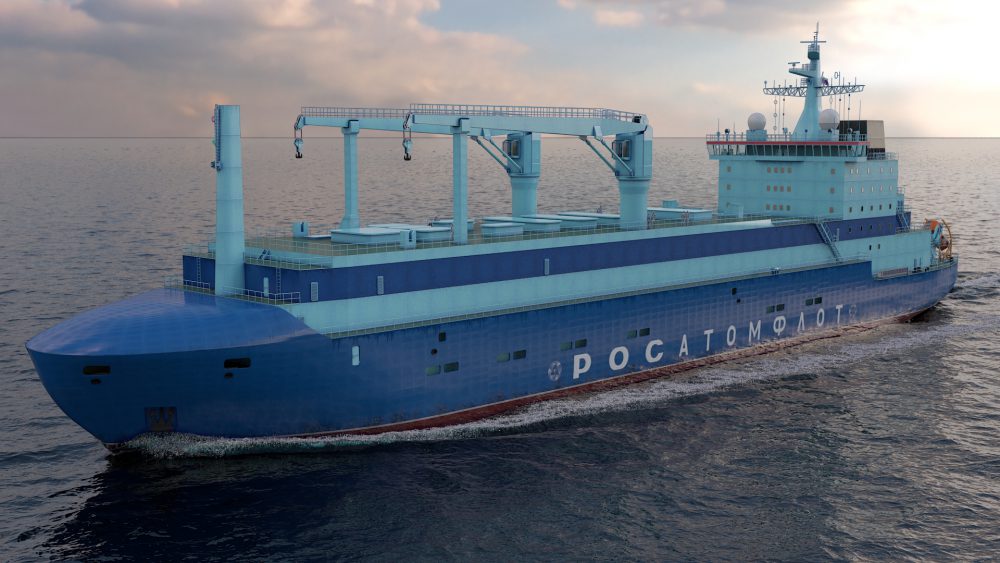
GarryB, Hole, owais.usmani, Broski and Podlodka77 like this post

Krepost- Posts : 741
Points : 743
Join date : 2021-12-07
Hole and Broski like this post

